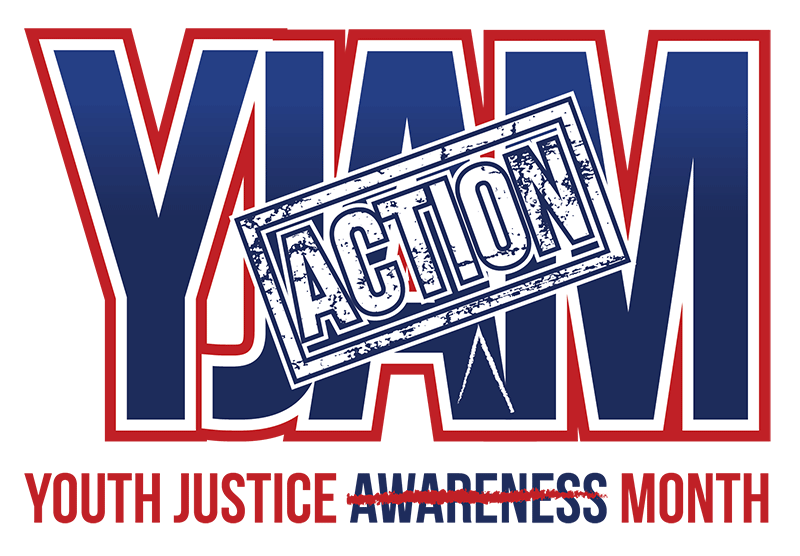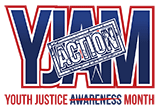Businesses Building a Better Way for Formerly Incarcerated Youth
Tuesday, 24 October 2017
By Rachel Kenderdine, Operations & Human Resources Manager
This week, as a part of October’s Youth Justice Action Month (YJAM), we are celebrating Alternative Pathways out of the adult system. For many youth prosecuted and incarcerated in the adult criminal justice system, life after release is challenging. Adult criminal charges can often act as a prison sentence, even once youth are no longer behind bars—opportunities to get a job, especially one with a livable wage, to attend college, and even to find housing are limited, since many establishments will not even consider an applicant if they have a past felony charge. Since 90% of incarcerated youth return home before their 25th birthday, these young people often feel that their hopes for a future are dashed before they have a chance to show their potential.
However, over the past few years a growing number of businesses have been recognizing that potential and giving formerly incarcerated youth a chance. Three of CFYJ’s partners—Drive Change, Pop! Gourmet Popcorn, and Flikshop—are among those businesses that are dedicated to providing opportunities and marketable skills to those who have faced felony charges in the past.
Founded in 2013, Drive Change was launched by a former teacher who spent three years teaching youth incarcerated at Riker’s Island, an infamous jail in New York City. She saw how many former inmates struggled to find a job after their release, so she left her teaching job to form a new organization that would help to solve that problem. Drive Change is a food truck and catering business in New York, but with a twist: it gives youth between the ages of 17 and 25, recently released from adult jail or prison, the chance to participate in a year-long job skills and professional development program. Over the course of 12 months, Drive Change Fellows go through training, a period of working on the food truck in various positions (like chef, cashier, and manager), and an internship in a professional office capacity. Fellows also attend a series of professional development classes on hospitality, marketing, and money management, for example, during their time at Drive Change. The goal is to build Fellows’ skills to lower the chance of recidivism, and give them strong experience that they can carry with them to their next job. Drive Change is making a difference in the lives of formerly incarcerated youth in New York.
Many formerly incarcerated people also tap into their entrepreneurial spirit to launch their own companies once they find that many career paths are closed to them. Marcus Bullock, creator and owner of Flikshop, is a great example. Marcus was charged as an adult and incarcerated at the age of 15, and started to work with families of incarcerated youth after his release. This inspired him to create Flikshop, an innovative app that allows the families of those currently in prison to send 99 cent postcards, complete with photos, to their incarcerated family members with the click of a button. Not only does Flikshop make it easier for incarcerated people to stay connected to their loved ones, but Marcus also uses it to develop other entrepreneurs who have spent time in prison. He runs the Flikshop School of Business, where he teaches fellow formerly incarcerated youth to code, develop apps, and create business plans to use in the future. Marcus and Flikshop bring hope to inmates, families, and formerly incarcerated youth alike every day.
Pop! Gourmet Popcorn, based in Seattle, Washington, emerged from a similar story. Pop!’s founder, David Israel, was incarcerated in 2003, and he created while in prison the plans for a gourmet popcorn store. That store opened in Seattle in 2011, four years after David was released. Today, Pop! is not only sold in the flagship store, but is on the mass market and sold in Starbucks and grocery stores around the United States. Importantly, David has made it part of his mission to hire formerly incarcerated people to work in his store and manufacturing plant, and today over 20% of Pop!’s employees have spent time in prison. Employers like David understand the difficulty of finding a job after a felony charge, and want to extend opportunities to everyone they can.
These three businesses, along with a number of others—such as UTEC in Massachusetts, CURYJ in California, Dave’s Killer Bread in Washington state, or Greyston Bakery in New York—recognize that mistakes in our past should not define us for the rest of our lives. Every person deserves second chances, and providing formerly incarcerated people with prospects for a future, rather than locking them out of all opportunities for success, is crucial because it re-frames society’s idea that punishment should extend beyond a prison sentence. As our nation’s youth come home, they should be met with chances for a smooth and successful re-entry into the workplace, and into our society as a whole.

